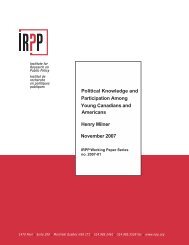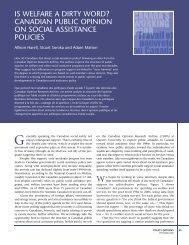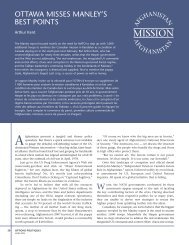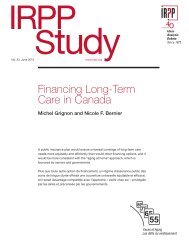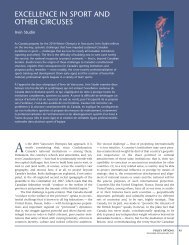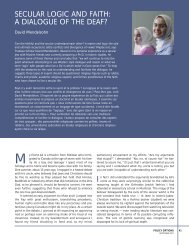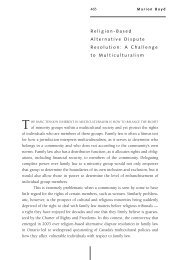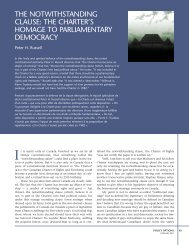THE SAGA OF BILL C-30: FROM CLEAN AIR TO CLIMATE ...
THE SAGA OF BILL C-30: FROM CLEAN AIR TO CLIMATE ...
THE SAGA OF BILL C-30: FROM CLEAN AIR TO CLIMATE ...
You also want an ePaper? Increase the reach of your titles
YUMPU automatically turns print PDFs into web optimized ePapers that Google loves.
expressed the view that meeting Kyoto<br />
targets purely through domestic action<br />
was no longer possible. Some urged a new<br />
focus on technology. Many urged that the<br />
most effective step would be a carbon tax.<br />
Others focused solely on the weakness of<br />
th Bill in dealing with air pollution.<br />
The most pugnacious witness was<br />
the new environment minister, John<br />
Baird. He appeared with a single slide on<br />
his PowerPoint. It was a graph of increasing<br />
GHG emissions with a solid line to<br />
2007 and then a dotted line thereafter,<br />
one that continued to climb into the<br />
future. No one asked him why his government’s<br />
intentions and new plans<br />
would allow emissions to rise. He had a<br />
fancy laser pointer that kept going to the<br />
place when Stéphane Dion was elected or<br />
when Stéphane Dion became environment<br />
minister. His heated exchanges<br />
with the equally pugnacious David<br />
McGuinty brought parliamentary committee<br />
hearings to a new low. As Aaron<br />
Freeman commented in a Hill Times article,<br />
the C-<strong>30</strong> committee clearly needed<br />
“adult supervision.”<br />
The clause-by-clause review of<br />
amendments may have been the most<br />
childish and nasty part of the hearings.<br />
Last-minute Liberal amendments<br />
were met with frustration and feigned<br />
disbelief from the NDP and the<br />
Conservatives. Watching the process,<br />
the only party that always seemed to<br />
keep its eye on the ball and climate as<br />
an issue was, perhaps surprisingly, the<br />
Bloc and its exceptional environment<br />
critic, Bernard Bigras, although individual<br />
MPs did shine brighter than<br />
their caucuses — gold stars to NDP MP<br />
Dennis Bevington and Liberals John<br />
Godfrey and Francis Scarpelligia.<br />
By the end, the Bill was unrecognizable.<br />
The bad sections had been<br />
uprooted. The constitutional vulnera-<br />
bilities had been fixed. The new Liberal<br />
carbon budget had been added. New<br />
sections calling for meeting Kyoto<br />
between 2008 and 2012, with mid-term<br />
targets at 2020, 20<strong>30</strong> and 2050, were in<br />
place, and they were the right targets.<br />
Nathan Cullen, the NDP environ-<br />
ment critic, brought in champagne<br />
and cake. Conservatives refused either.<br />
What was there to celebrate? Brian<br />
Jean, Conservative MP from Fort<br />
McMurray, whose prosecutor skills<br />
were used to cross-examine witnesses<br />
until they said the opposite of what<br />
they had intended, said that he didn’t<br />
drink champagne at a funeral.<br />
Was the Bill dead?<br />
The saga of Bill C- <strong>30</strong> is a long way<br />
from resolved. At this writing, it<br />
has not been brought to the House of<br />
Commons. It has had a complete overhaul<br />
with no sign the government will<br />
accept what has been done to its Bill at<br />
first reading. The only intriguing hint<br />
was an interview with John Baird on<br />
CBC Radio’s The House. Strangely, in<br />
describing the C-<strong>30</strong> process, Minister<br />
Baird went out of his way to say several<br />
times how helpful the NDP members<br />
had been. This was certainly not<br />
apparent in the hearings. The evisceration<br />
of the Bill appeared equally concerted<br />
from all three opposition parties.<br />
The only difference was that the<br />
NDP generally could not resist asking<br />
witnesses, including John Baird, if they<br />
did not agree that the Liberals had<br />
been really dreadful. Conservatives<br />
seemed almost embarrassed by the<br />
silliness of the question and I wondered<br />
often how Nathan Cullen could<br />
bring himself to keep asking it.<br />
H ere<br />
The saga of Bill C-<strong>30</strong>: from clean air to climate change, or not<br />
By the end, the Bill was unrecognizable. The bad sections had<br />
been uprooted. The constitutional vulnerabilities had been<br />
fixed. The new Liberal carbon budget had been added. New<br />
sections calling for meeting Kyoto, between 2008 and 2012,<br />
with mid-term targets at 2020, 20<strong>30</strong> and 2050, were in<br />
place, and they were the right targets.<br />
are the options and where the<br />
Baird hints lead me.<br />
One option is, of course, that the<br />
Harper government will allow the Bill to<br />
die. It will blame the opposition parties<br />
for stopping action to clean the air and<br />
reduce GHGs. It can campaign on how<br />
it needs a majority to stop these obstructionist<br />
opposition parties from blocking<br />
“action.” This strategy might<br />
work as long as the public<br />
can be kept from understanding<br />
how dangerous the<br />
Bill actually was.<br />
Another option would<br />
be to call the Bill a confidence<br />
vote and bring back<br />
the original Bill, or one so<br />
little changed that it would fail, triggering<br />
an election. At this point blaming<br />
of the opposition parties for thwarting<br />
action would still be the likely scenario.<br />
The third, and I will now lay bets<br />
that it is the most likely, is that the Bill<br />
will come back to the House, rewritten<br />
so that only the NDP can support it.<br />
Both Harper and Layton could take<br />
credit for progress, praising their ability<br />
to work with each other. After all, this is<br />
precisely how Baird, in his previous role<br />
as president of Treasury Board, got the<br />
Accountability Act through the House.<br />
The likely scenario: the new Bill would<br />
strip out Liberal amendments for the<br />
carbon budget, take out the 2012 Kyoto<br />
target but keep an appropriate target for<br />
2050, put the air pollution and GHG<br />
sections back where they belong in part<br />
5, and move from intensity targets in<br />
the short term (the only kind yet<br />
accepted by the Harper government) to<br />
hard caps in the future.<br />
Bottom line: the bill without<br />
Kyoto is not acceptable. But will a<br />
Harper-Layton partnership obscure<br />
this to the voter?<br />
Climate is very likely to remain an<br />
election issue, whenever that may come.<br />
Elizabeth May, former director of the<br />
Sierra Club of Canada, is the leader of<br />
the Green Party of Canada. A former policy<br />
adviser to Environment Minister Tom<br />
McMillan in the Conservative government<br />
of Brian Mulroney, she has closely<br />
tracked climate change for more than 20<br />
years. emay@magma.ca<br />
POLICY OPTIONS<br />
MAY 2007<br />
47






